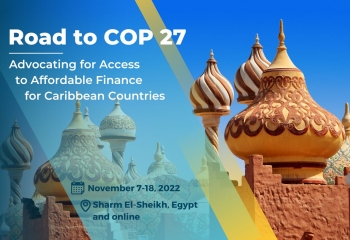
I am pleased to be part of today's timely discussion on financing investments in emerging economies, policy, investment, and dispute resolution.
Your ongoing effort to include the Caribbean Development Bank (CDB) in these discussions does resonate with us.
Jamaica is a large shareholder, and significant beneficiary of our financing.
We have been cementing this relationship for over 50 years.
So, why is today's discussion so important?
COVID-19 has undermined our already fragile regional economies.
The impact has been severe, with gross domestic product declining by over 7% in 2020; significant job losses; and fiscal and debt sustainability concerns exacerbated as governments seek to contain the virus's spread; provide economic stimulus and protect vulnerable groups.
Many of you may concur with my view that there is still a lot of uncertainty about when we can abate this crisis AND accurately determine the scale of its impact on our economies.
Like me, you are also probably thinking, "buoy, bad luck wuss dan Obeah!"
But after much reflection, I have arrived at the position associated with Caryn Sullivan, who said: "in the face of adversity, we have a choice. We can be bitter, or we can be better..."
In short, we will need to mount an extraordinary response to facilitate the rebuilding and recovery of our economies. With this approach, our Region can get back on track to meet its commitment to the Sustainable Development Goals.
Now more than ever, the synergistic roles of the public and private sectors and development agencies like CDB come into stark focus.
They will be required to provide the necessary financing and human resources and adopt complementary policies and institutional support.
In the time allotted to me, I will touch briefly on two general areas.
First, what are the possible derailers for the private sector to become the engine of sustainable growth and development?
At the top of the list would be an uncertain business environment marked by, among other things, growing protectionism, worsening trade disputes, institutional weaknesses, and lack of transparency.
Improvements in public financial management are also critical considerations in investment decisions. Widening fiscal deficits point to inefficiencies and policy ineffectiveness; and an increasing reliance on debt creates financial vulnerabilities. Governments that prioritise fiscal and debt sustainability contribute significantly to creating a business-friendly environment.
It is noteworthy that the Government of Jamaica's steadfast efforts to accumulate sizeable fiscal surpluses provided a much-needed cushion to meet the unanticipated expenditures associated with COVID-19. We applaud the Government’s ongoing commitment to build such buffers as part of a broader effort to facilitate private sector development.
I turn now to the role of the CDB. In keeping with our poverty reduction mandate, we are very mindful of our role in galvanising a competitive business-friendly environment. Our primary focus is on micro, small and medium enterprises (MSMEs) across all economic sectors, including agriculture, which embrace the power of digital technologies.
Recent initiatives include:
- improving MSMEs’ access to credit through financial intermediaries; capacity building through our Caribbean Technological Consultancy Services Network; and trade facilitation under the new Economic Partnership Agreement Standby Facility launched in 2020;
- centralising all aspects of our private sector interface in a restructured Private Sector Division;
- revamping our procurement policy and procedures to become more "fit for purpose" and aligned with Multilateral Development Bank best practices;
- promoting more rigorous and transparent public procurement legislation, regulation, and practices at the national level; and
- amending our standard loan conditions, including in the area of arbitration, to ensure that we remain in step with international best practice in the financial sector.
What has COVID-19 taught us?
The 18 months have taught us that Jamaica’s reliance on tourism and bauxite/alumina for over 50% of foreign exchange earnings, and more than a quarter of jobs needs to be addressed.
Concentration is a serious risk for most businesses and for most countries!
The trick now is to move towards a more diversified economy, and with special focus on MSMEs in manufacturing and services which can compete domestically, regionally, and world-wide.
The ability to be globally competitive will be dependent upon the adoption of digital technologies, underpinned by a business‑friendly environment, and the availability of a suitably skilled workforce, even if those skills must be imported.
Thank you.


